Search Results
Showing results 101 to 120 of 137

Motor Effect
Source Institutions
See what force a magnet has on a wire that has current running through it: will it push it, pull it, or will nothing happen? This is the foundation of a simple electric motor.
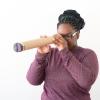
Persistence of Vision
Source Institutions
If you had a long tube with a 5 millimeter wide slit, would you see the entire Golden Gate Bridge?
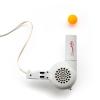
Balancing Ball: Suspend a ball in a stream of air
Source Institutions
Balance a ball in the air with a hair dryer! This Exploratorium produced activity shows learners concepts like lift and air streams. You can try many different angles, speeds, and ball types.

See the Light
Source Institutions
Learners mix a solution of luminol with hydrogen peroxide to produce a reaction that gives off blue light.
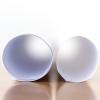
Lateral Inhibition
Source Institutions
Which one of your eyes are dominant? Do they act independently or are they equally "in control?" This activity explores how your eyes work (or don't work) together.

Bounce vs. Thud Balls
Source Institutions
Learners compare the properties of two balls that appear identical. One ball bounces, while the other ball "thuds." The “bounce” ball is made of the polymer polybutadiene (-C4H4-).
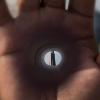
Hole in Your Hand
Source Institutions
Create an illusion where it appears that your hand has a hole in it. You'll see the results from when one eye gets conflicting information.

Smell the Maillard Reaction
Source Institutions
In this activity, learners cook amino acids and sugar to explore the range of aromas released.
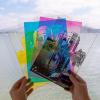
The Three Little Pigments: Science activity that demonstrates the primary and secondary colors of lightScience activity that demonstrates the primary and secondary colors of light The Three Little Pigments Know your C, M, Y, and K.
Source Institutions
Align four color transparencies, each one a single color (cyan, magenta, yellow, and black), and see a beautiful full color image.

Momentum Machine: Speed up your spin
Source Institutions
Spin in an office chair holding milk jugs! Plus, learn physics. Very fun (but stay safe) activity from the Exploratorium Science Snacks series.

Center of Gravity
Source Institutions
A simple, yet fun activity that lets learners find the center of balance of a ruler (or any long thin object). Developed by the Exploratorium and no assembly needed.
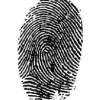
Dusted!
Source Institutions
Learners press their fingertip onto a clean Plexiglas sheet. The fingerprints are then revealed as learners dust over the print with fingerprint powder.
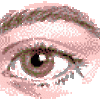
Think Fast!
Source Institutions
This is a quick and simple demonstration about reflexes (fourth activity on the page). One learner stands behind a see-through barrier like a window or wire screen.
One-Cut Paper Stars
Source Institutions
Here's a very simple activity if you have paper and scissors: make one cut, unfold, and you have a beautiful star! A great way to learn about polygons and origami mathematics.
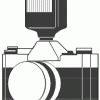
First Impressions
Source Institutions
Learners experiment with a commercial photo-sensitive paper (Sunprint® or NaturePrint® paper). They place opaque and clear objects on the paper and expose it to bright light, observing the results.

Vanishing Rods
Source Institutions
This is a quick activity/demonstration that introduces learners to the concept of index of refraction. Learners place stirring rods in a jar of water and notice they can see them clearly.

Your Sense of Taste: Discover the real taste of candy
Source Institutions
Your tongue can sense about 6 different flavors (salty, sweet, bitter, sour, umami/savory, and fat), but your nose provides a lot more "taste" information than you realize when you eat.
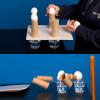
Egg Drop
Source Institutions
Perform this classic inertia demonstration to illustrate the transfer of potential energy to kinetic energy.
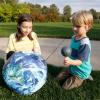
Exploring the Solar System: Solar Eclipse
Source Institutions
Exploring the Solar System: Solar Eclipse” is a hands-on activity demonstrating how the particular alignment of the Sun, Earth, and Moon can cause an eclipse.
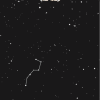
Constellation Detective
Source Institutions
In this quick activity, learners practice locating a constellation in a map of very dark skies.
